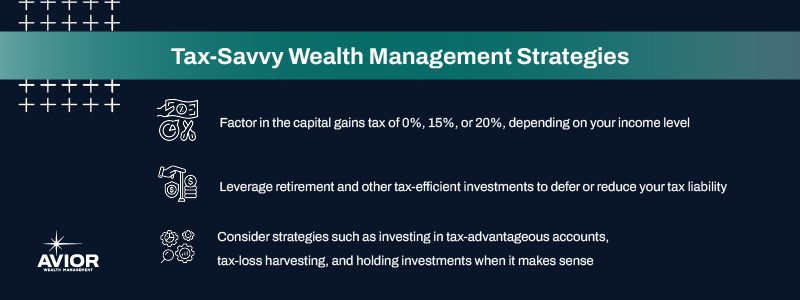Tax-Savvy Wealth Management Strategies
Factoring in the tax implications of your investments helps you plan for long-term growth and tax minimization. These strategies will help you determine your best options as part of your wealth management plan.

Your wealth management strategy requires a delicate balance of risk and return. It also requires careful attention to your tax liability, as tax obligations can significantly impact your ability to grow and protect your wealth.
Keeping a tax-savvy mindset will help you optimize wealth management. Consider these practical strategies when making investment decisions to optimize growth and retain more of your earnings while complying with tax requirements.
Breaking down the tax implications of your investments
Over time, your investments may accrue interest, and you may receive dividend payouts. This income is usually taxed at your normal tax rate. You must pay taxes on any gains you make when you sell an investment.
The capital gains tax should be an important part of your tax strategy. This tax applies to long-term capital gains, which are for assets you hold for over one year. Short-term capital gains are taxed at your normal tax rate.
Depending on your income and whether you file as an individual or jointly, you’ll usually have to pay either 0%, 15%, or 20% in capital gains tax. For 2024, if your income is $47,025 or less, you pay 0% in capital gains. Most investors will fit into the 15% category, which applies to incomes between $47,026 and $518,900 in 2024. Anyone making over that amount is subject to the 20% capital gains tax rate.
Tax-efficient investment accounts
Certain types of investments allow for significant tax benefits. A key piece of your portfolio is retirement savings, as accounts like 401(k)s and IRAs give you tax advantages.
- 401(k)s and 403(b)s: These employer-sponsored accounts allow you to defer taxes on contributions, so you contribute with pre-tax dollars. Many employers will match your contributions, allowing you to save even more.
- Traditional IRAs: Individual retirement accounts work similarly to 401(k)s in that you contribute pre-tax dollars, but you can open these accounts without an employer.
- Roth accounts: Converting your 401(k) or IRA to a Roth account means you pay tax on contributions now, and your funds grow tax-free and withdrawals in retirement are tax-free.
- Health savings accounts (HSAs): These accounts allow you to save for future medical expenses when you have a high-deductible health plan. Withdrawals are tax-free when they’re used for qualifying costs, and you can deduct your contributions.
- 529 college savings plans: If education is a priority for your family, consider opening a 529 plan, which allows you to save money for education expenses. Taxes are deferred, and if withdrawals are used for qualified education costs, withdrawals are tax-free.
Because of these accounts’ tax and savings benefits, consider saving as much as possible with them each year. Many retirement accounts offer plenty of opportunity for growth over time, and as you near retirement, you can take a more conservative approach to protecting your savings.
Tax-savvy wealth management strategies
Understanding how investments are taxed and which vehicles bring the most tax benefits will help you minimize taxes. There are a few other strategies to consider as you’re making elections and establishing your portfolio:
Diversify with your asset allocation
Each class of investment, whether stocks, bonds, mutual funds, real estate, and others, has different tax and growth implications. By spreading out your assets and diversifying your investments, you are also spreading risk and taking advantage of each vehicle’s benefits.
Be strategic with your timing
Timing can be everything with investments. You may be able to reduce your capital gains tax bill by selling an asset at a net loss, which then offsets capital gains. This strategy is known as tax-loss harvesting.
Another timing-related factor is when you take capital gains. If you have a lower income year, for example, you can decide to sell and take capital gains when you’ll be taxed at the 0% rate.
Regularly review and reallocate
Tax laws do change frequently, so make sure you have a plan for keeping track of legislation that impacts your investments. The best practice is to review your portfolio performance regularly to monitor for areas that could use a different strategy. As the different markets go up and down, you may decide to allocate your assets differently as well to get the most tax benefits.
The role of tax planning in wealth management
Managing, securing, and growing your wealth requires careful tax planning. There are many strategies to harness that will help you minimize your tax liability while maximizing your performance and returns.
This is why tax planning is a key part of wealth management. The way you allocate your assets and plan for the future will have significant tax implications that you need to account for.
Work with the team at Avior for expert tax planning guidance. We will help you understand how your investments will be taxed and how to implement tax-savvy best practices to minimize your tax bill.
Contact Avior today to get started with tax planning services as part of your wealth management strategy.
Disclaimer: Nothing contained herein should be construed as legal or tax advice. Avior and our Advisors will work with your attorney and/or tax professional to assist with your legal and tax strategies. Please consult your attorney or tax professional with specific legal and/or tax questions. Investment Management and Financial Planner are offered through Avior Wealth Management, LLC, an SEC-registered investment advisor. Past performance is not a guarantee of future results. Investments are subject to loss, including the loss of principal.
No Comments
Sorry, the comment form is closed at this time.




